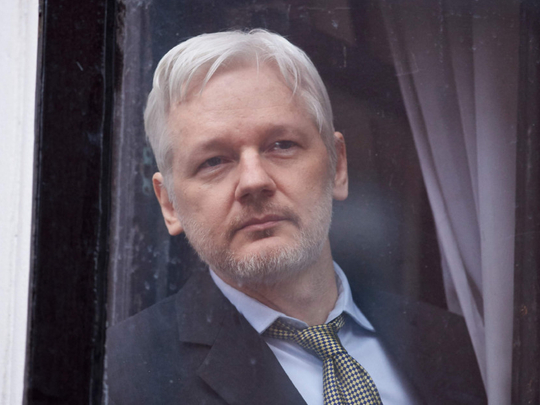
Julian Assange says he’s been vindicated. The United Nations Working Group on Arbitrary Detention has pronounced that the Wikileaks editor, sought by the United States for publishing thousands of embarrassing documents and wanted for questioning by Swedish prosecutors in connection with rape allegations, has found in his favour.
The ruling states that he has indeed been “arbitrarily detained” by British authorities and deserves to be compensated. Speaking to a crowd of media and supporters from the embassy’s balcony shouting “We love you Julian”, he sounded victorious. But until now his triumph is simply a moral coup when, should he be foolish enough to step out on the street, he would be immediately arrested and packed off to Stockholm.
The panel’s decision was made on the premise that if Britain was able to extradite him to Sweden, his fear that he would subsequently be flown to the United States to be tried under its espionage act and, if found guilty, could spend the rest of his life in prison or receive the death penalty, is well grounded. A Federal Grand Jury was appointed in Virginia and there are claims regarding the existence of a sealed indictment.
The United Kingdom and Sweden have dismissed the UN report. The British Foreign Secretary Philip Hammond said it was “ridiculous”, describing Assange as “a fugitive from justice”.
Nevertheless, the UN’s pronouncement is an embarrassment for both countries which trumpet their “squeaky clean” rights records and respect for international law. On this, they have chosen to poke the United Nations in the eye.
The Australian has been holed-up in an embassy office for three-and-a-half years with little other than his laptop, a bed and an exercise machine. The posse of policemen outside primed to pounce have cost the British taxpayers millions of pounds just to ensure he can’t escape in a rolled-up carpet.
Many believe he’s a hero for exposing human rights violations committed by democratic governments that by their very nature are answerable to the people and bound to transparency; others would love to see him hanged for what they consider to be treachery. Britain has acted as his prison guard notwithstanding that in legal terms he has committed no offence under UK law and neither has he been charged with anything in Sweden. In fact, he has already given his testimony to Swedish police saying the relations with his accusers were consensual.
The prosecutor declared “I don’t think there is reason to suspect that he has committed rape,” and he was free to leave the country. A month later — “coincidentally” following the release of the Wikileaks cable cache — the director of public prosecution resurrected the case and issued a European arrest warrant in his name.
Acting under Washington’s thumb
What really stinks is the fact that Sweden refused to send a prosecutor to question the suspect in another country, whereas there have been many precedents for that arrangement. There was nothing preventing Swedish prosecutors interviewing him while he was in the custody of the British police and at one time they were invited to meet with him inside the embassy which they declined.
A British court signed off on the Swedish extradition order, a decision later upheld by the High Court. It was then that Assange became a fugitive for justice or rather injustice.
The UN Panel’s former chairperson called the extradition request “disproportionate” stressing that “the normal course of action for the Swedish authorities would have been to interview Assange in London”.
Those who suspect Britain and Sweden are acting under Washington’s thumb may have a point. NSA whistleblower Edward Snowden revealed that the US had asked its allies to open criminal investigations against Wikileaks and its founder.
Their behaviour is now bordering on vindictive. Three of Sweden’s allegations have now been dropped because the relevant statute of limitations has expired; the one remaining will expire in 2020. Assange will be able to walk free in less than four years but by then he will have been deprived of ten years liberty beginning with his house arrest that began in December, 2010.
Moreover, last year he was in constant and severe pain, which his doctor is unable to diagnose with an MRI scan. Ecuador asked the British government to allow him safe passage to hospital for medical tests on humanitarian grounds. The UK Foreign Office denied the request.
The dismissive statements from Britain and Sweden in answer to the UN panel and their determination to inflict as much misery as possible on an award-winning journalist who, rightly or wrongly, followed his conscience and is charged with nothing at all, reflect badly on those governments. Are they out to save face or are they reluctant to disappoint their American partner waiting in the wings? Whatever the reason this farce has gone on long enough and the more it continues, the more the joke is on them.
Linda S. Heard is an award-winning British political columnist and guest television commentator with a focus on the Middle East.









